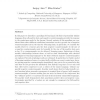Free Online Productivity Tools
i2Speak
i2Symbol
i2OCR
iTex2Img
iWeb2Print
iWeb2Shot
i2Type
iPdf2Split
iPdf2Merge
i2Bopomofo
i2Arabic
i2Style
i2Image
i2PDF
iLatex2Rtf
Sci2ools
103
click to vote
ALT
2004
Springer
2004
Springer
Learning Languages from Positive Data and Negative Counterexamples
In this paper we introduce a paradigm for learning in the limit of potentially infinite languages from all positive data and negative counterexamples provided in response to the conjectures made by the learner. Several variants of this paradigm are considered that reflect different conditions/constraints on the type and size of negative counterexamples and on the time for obtaining them. In particular, we consider the models where 1) a learner gets the least negative counterexample; 2) the size of a negative counterexample must be bounded by the size of the positive data seen so far; 3) a counterexample can be delayed. Learning power, limitations of these models, relationships between them, as well as their relationships with classical paradigms for learning languages in the limit (without negative counterexamples) are explored. Several surprising results are obtained. In particular, for Gold’s model of learning requiring a learner to syntactically stabilize on correct conjecture...
ALT 2004 | Machine Learning | Negative Counterexamples | Negative Data | Specific Negative Counterexample |
Related Content
| Added | 15 Mar 2010 |
| Updated | 15 Mar 2010 |
| Type | Conference |
| Year | 2004 |
| Where | ALT |
| Authors | Sanjay Jain, Efim B. Kinber |
Comments (0)

